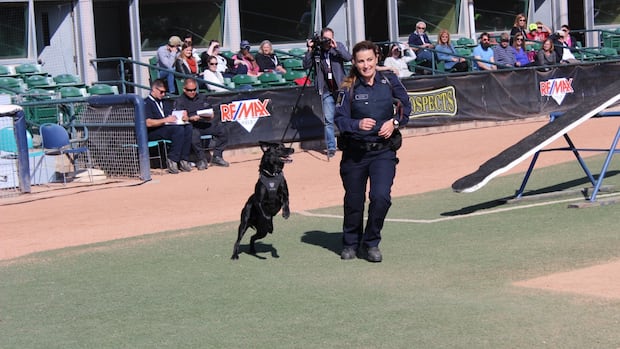[
A former Canada Border Services Agency dog handler who filed a grievance over the program’s maternity leave policy went on to face a “mobbing” of bullying and harassment that management knew about, a third-party investigator found.
For years Danielle Getzie said she had her dream job, working with her canine partner Nova to help sniff out contraband at the Vancouver airport.
But the program’s family leave program never sat well with her.
The CBSA’s Detector Dog Service policy capped the length of time trainers can be away from their animals at 90 days — making it incredibly hard for new parents, especially mothers, to return to the job. At the time, the border agency justified the policy as necessary to ensure that detector dogs stay connected to their trainers and don’t lose their skills.
After watching a colleague come back within 89 days of having a baby in 2018, Getzie said she decided to make a formal complaint about the 90-day policy, arguing it was discriminatory.
An adjudicator agreed with her, but Getzie said she hasn’t had much to celebrate in the years since.
Not only did the policy remain on the books until this year, but Getzie told CBC News in 2023 she was “terrorized” by her colleagues and ultimately frozen out of the specialized dog program.
The case landed with CBSA’s National Integrity Centre of Expertise (NICE), an independent unit that responds to allegations of inappropriate behaviour in the workplace.
According to a third-party investigator brought in to review the case, Getzie “was a victim of harassment through mobbing, through a lack of management responses.”
The report, which was shared with CBC News, defines mobbing as bullying and harassment from a group of employees. In Getzie’s case, the investigator found one colleague had “a strong dislike” of her and because they were in a position of power, other staff members “used tactics of intimidation” to either comply or side with the ringleader.
Management response lacking: report
It had harsh language for the upper levels at CBSA and how the organization operates.
“It is a failure by the system,” it reads.
According to the investigation, “harassing behaviours were reported to management, which were received with a lack of action, and a subsequent lack of accountability towards the alleged individuals who committed the harmful acts.”
It said the only real action management took was to change the work schedule “which was an insufficient response.”
“Mob mentality is alive and real,” said Getzie in an interview.

“Management did not protect me against severe bullying and harassment in the workplace.”
The NICE investigation process is not mandated to find blame.
It recommended that CBSA should have a workplace assessment done in order to “demonstrate the lack of policies or the enforcement of such policies if they exist.”
Luke Reimer, a spokesperson for the CBSA, said they couldn’t comment on Getzie’s case citing privacy laws, but added the agency “takes all findings very seriously and works to ensure a safe, healthy and harassment- and violence-free work environment for all employees.”
Policy updated in April
Reimer said the dog-hander program’s leave policy was modified in April and “now assesses all situations on a case-by-case basis when deciding how to manage the detector dog during these periods.”
“When the reason for leave is protected under the Canadian Human Rights Act, the handler will be permitted to resume their assigned position upon their return, which may be with their previous dog or a new canine partner,” Reimer said in a statement.
Getzie’s case isn’t the first time bullying and harassment within the CBSA have surfaced.
A scathing 2020 auditor general report found CBSA knew about ongoing problems with harassment, discrimination and violence in its workplaces — but didn’t do enough to address them.
It’s why Getzie, who is still on unpaid leave as she fights her labour grievance and waits for the Human Rights Commission to weigh in, said she’s willing to put in the work to push for more changes.
“The next person that chooses to stand up and fight about this, I want it to be easier for them,” she said.
“I need to make what happened to me — this attack, this punishment, the retaliation, all of that — I need to make that mean something.”
